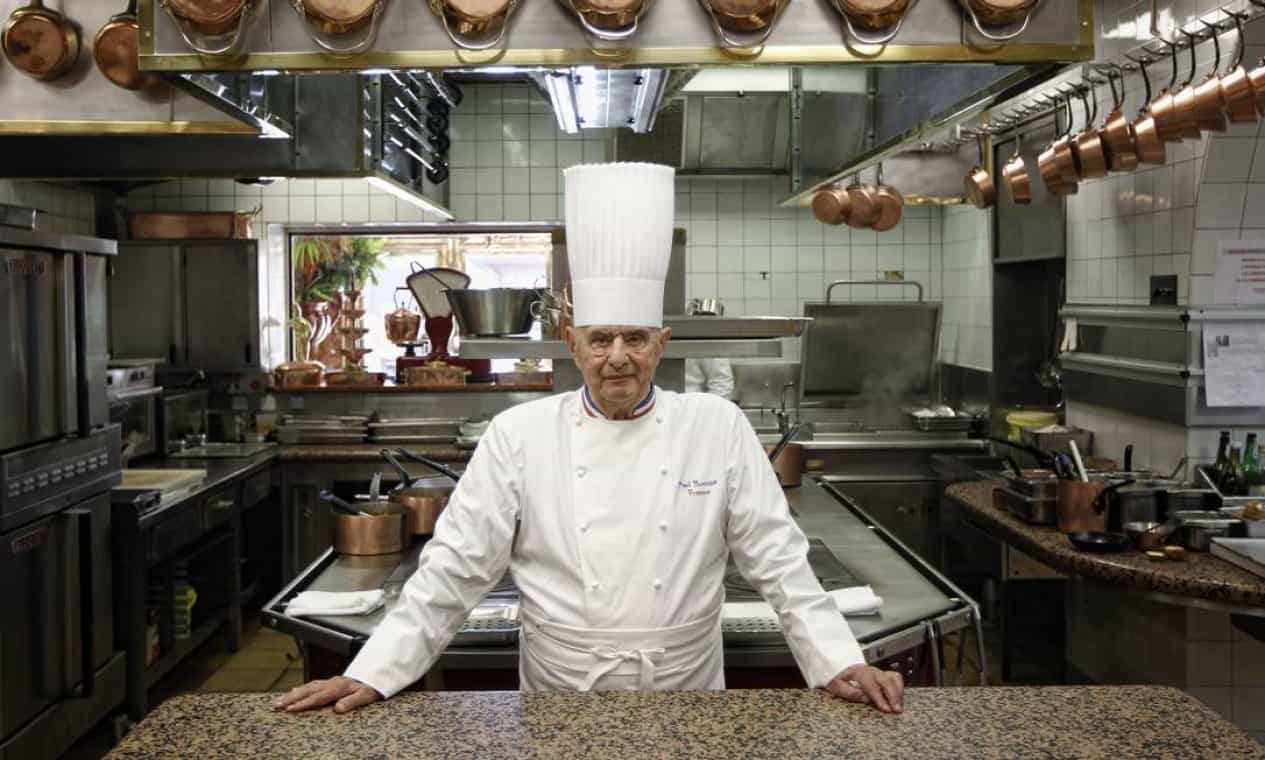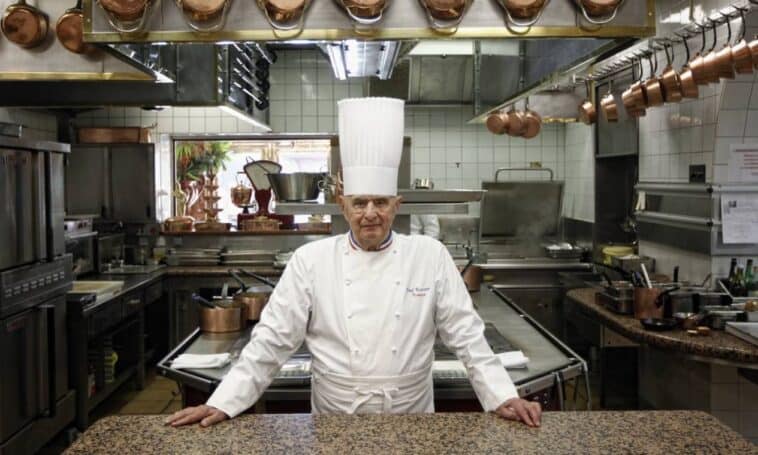Renowned chef de cuisine Paul Bocuse (1926 – 2018) is regarded and revered as one of the most influential masters of French and world cuisine. Chef of the century.
He was considered and revered for being one of the creators of Nouvelle Cuisine, thanks in part to his book “The Market Kitchen.”
The movement born in the 1970s became the pillar of modern cuisine by prioritizing simple cooking without losing sophistication and refinement.
He was considered and revered for having mentored great Chefs of today and forever a great inspiration for students of gastronomy.
He was also considered and revered for his outstanding contributions to the gastronomic world.
Paul Bocuse’s Great Contributions to Gastronomy
In addition to participating in creating, establishing, and disseminating Nouvelle Cuisine, Paul Bocuse created the Bocuse d’Or and founded the Paul Bocuse Institute.
Bocuse d’Or
Paul Bocuse is the creator of the Bocuse d’Or, a world culinary championship, also called the “Gastronomy Olympics,” held every two years in Lyon, France.
An event in which participants from 24 countries compete over two days, receiving marks for taste, dish presentation, originality, fundamental hygiene aspects, food waste, and teamwork.
An essential competition for starting a successful career for new chefs in the culinary world by putting them in the spotlight and promoting them in the international gastronomic market.
Paul Bocuse Institute – Hospitality and Culinary Arts
The Paul Bocuse Institute, founded by him in Ecully, near Lyon, France, is a respected and world-renowned school of gastronomy and hospitality.
The institute offers hotel and gastronomy courses with classes in classic and modern French cuisine, confectionery, and baking with the right to an internship in the institute’s kitchen.
The gastronomic biography of Paul Bocuse
For Paul Bocuse, gastronomy is a family heritage acquired from his father Georges and his mother Irma Bocuse, whose families have been active in the gastronomic world since the 18th century.
Georges, his father, worked for many years in the kitchens of various establishments until he took over the kitchen of his father-in-law’s restaurant. The Auberge Du Pont de Collonges.
Bocuse made his culinary debut at only ten years old, a restaurant that served family meals.
When he turned 15, he became an apprentice in Claude Maret’s restaurant, and by the age of 16, he was in charge of buying the most varied and freshest raw materials for the house cuisine.
After completing his training as a chef, he worked in various restaurants in Lyon and Paris until he worked for six years in the three-star restaurant La Pyramide of the famous Chef Fernand Point.
From where he left in 1958 to take over the family restaurant, the Auberge Du Pont de Collonges and was awarded the first star in 1961 as the first Chef of his generation by the Michelin Guide, the most prestigious international gastronomic guide launched in 1900 in Paris by the tire manufacturer André Michelin.
And the second star in 1962 and the third star in 1965.
The 1970s were the peak of his career. His knowledge and experience led him to be recognized as one of the great masters of French and world gastronomy.
By becoming one of the chefs who changed the history of haute cuisine with the introduction of Nouvelle Cuisine. A movement from which contemporary cuisine emerged.
In 1975, Paul Bocuse served his most famous recipe for the first time, Soupe aux truffes (truffle soup), at a dinner at the official residence of the President of the French Republic, the Elysée Palace in Paris.
Soup prepared with beef stock, black truffles, white wine, foie gras, carrots, onions, celery, meat cut into very thin pieces, pinches of sea salt and black pepper, and a puff pastry crust that preserves the heat and aromas.
It is now served in his restaurant under Soupe aux truffles VGE, VGE being a tribute to the former President of France Valéry Giscard d’Estaing.
In 1982, Bocuse opened his restaurant in Epcot Center at Disney and, in 1987, the Bocuse d’Or.
In 1989 Paul Bocuse was elected Chef of the century by Gault et Millau magazine.
A year later, in 1990, he founded the Paul Bocuse Institute – Hospitality and Culinary Arts.
And in March 2011, through received the “Chef of the Century” award from the Culinary Institute of America school in New York City.
“He is one of the greatest and most iconic chefs of all time.”
A phrase said by Tim Ryan, President of the Culinary Institute of America, in presenting him with the award.

In February 2013, the Culinary Institute of America honored him by opening a restaurant inside the institute named after him at a party. In contrast, as a show of appreciation, several banners were placed with “Merci Bocuse.”
During this opening party, Paul Bocuse broke down one of his best-known dishes, the black truffle soup, in chefs Daniel Boulud and Thomas Keller, some of the many distinguished guests on the opening committee.
Throughout his brilliant career Paul Bocuse, the Chef of the Century, received many honors and awards, one of them being the medal of Commendatore of Ordre national de la Légion d’honneur.
The highest order of the French nation. French decoration awarded by Napoleon Bonaparte rewards eminent merits rendered to the nation by military or civilian personnel.
Paul Bocuse’s Relationship with Brazil
Paul Bocuse, whose professional and life goal was to escape classicism to highlight a more modern cuisine, made twenty-four visits to Brazil.
According to himself, the country is a land where tropical fruits are “excellent,” the flavors of meat and fish are lovely, and our feijoada is a great dish that harks back to Cassoulet.
His constant presence was fundamental for disseminating the French culture and the techniques of its gastronomy in Brazil.
As a consultant for the restaurant of the Meridien Hotel in the Copacabana district of Rio de Janeiro, in 1979, he sent his apprentice Laurent Suaudeau, a young and talented cook, to run it.
Later, in the first months of 1980, Chef Claude Troisgros arrived in Brazil, also through Bocuse’s recommendation, and started working in Rio de Janeiro.
Chefs who, in the 1980s, adapted the techniques of French cuisine and the teachings of Paul Bocuse and nouvelle to local ingredients.
A new culinary culture developed until the 1990s and 2000s when it emerged as “haute cuisine,” increasingly creative and recognized.
At the end of 2013, Tabata Bonardi was chosen by Paul Bocuse to be the Chef of his new restaurant in Lyon, Marguerite. The first woman to head the restaurant’s kitchen belonged to Bocuse’s group.
“I was in Brazil and the cooks used to tell me that they weren’t recognized, that being a cook in Brazil was a minor profession. Today, I believe that this has changed. This change, this recognition of the kitchen, is important. Before, the cook was nothing, and today he is recognized. The professional cuisine brought to Brazil, which has dishes like Feijoada, an enormous growth, with charm and refinement. And this is due to the power of haute cuisine, of the professional chef. I know I have a part in this change, I gave my contribution to this growth. “Paul Bocuse.

The gastronomic legacy of Paul Bocuse
Paul Bocuse, the Chef of the century, a man passionate about his profession, quite strict, but very generous with all the team, transferred his knowledge and his ideal of simple, light food, prepared with fresh ingredients, with little cooking, yet sophisticated to a whole generation of new chefs.
Like, the great chefs of French cuisine: Alain Ducasse, Jean-Georges Vongerichten, and Daniel Boulud, among many others no less famous.
Even Chefs who have not worked directly with this great master of French and world gastronomy were impacted by his teachings.
“Never hotplate or microwave. Always the fire, the sacred fire.”
Another great legacy of Paul Bocuse was his enormous contribution to a radical change in the image of the Chefs.
Since, far beyond teaching cooking techniques, he worked on his apprentices’ professional and personal attitude, teaching them never to be driven by competition but by commitment and teamwork.
The secret of success!
Chef Paul Bocuse died on January 20, 2018, at the age of 91, while asleep in his hometown of Lyon.
But, during his life, the Chef of the Century built a solid career, eternalized a new and modern cuisine, the Nouvelle Cuisine, as well as a gastronomic empire of worldwide recognition.
It comprises the luxury restaurant Auberge du Pont Collonges and other restaurants such as Marguerite and Ouest Express, a modern, upscale fast food joint.
And also, a chain of ten breweries operating in Japan and the city of Lyon called North, East, South, and West, where each house specializes in a different aspect of French cuisine.




GIPHY App Key not set. Please check settings